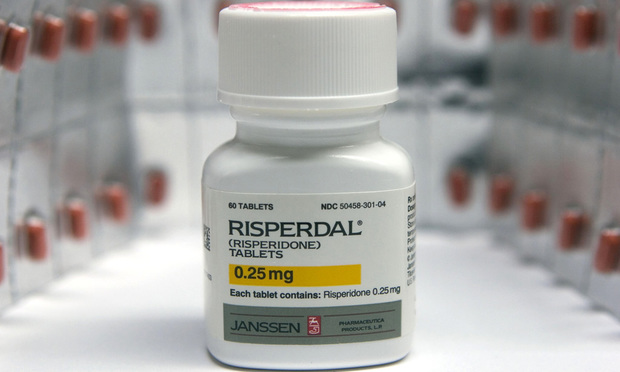Jury Told to 'Send a Message' in First Risperdal Punitive Damages Trial
"You 12 individuals, as a jury speaking as one, have that power," Kline & Specter attorney Thomas R. Kline told jurors.
October 08, 2019 at 04:49 PM
4 minute read
 Johnson & Johnson's schizophrenia drug Risperdal at Skenderian Apothecary in Cambridge, Massachusetts, on Jan. 23, 2007. Photo: JB Reed/Bloomberg News.
Johnson & Johnson's schizophrenia drug Risperdal at Skenderian Apothecary in Cambridge, Massachusetts, on Jan. 23, 2007. Photo: JB Reed/Bloomberg News.
The Philadelphia jury deliberating in the first punitive damages trial over the drug Risperdal needs to use its verdict to send pharmaceutical company Johnson & Johnson a message, an attorney representing a man injured by the medication said Tuesday.
"What happens today will have long-reaching consequences, in Philadelphia, in the nation, and, literally, from this little room in 275 [of Philadelphia City Hall], around the world," Kline & Specter attorney Thomas R. Kline told the jury, which has presided over the trial since mid-September. "We've tried for years, collectively, to change their behavior, but you 12 individuals, as a jury speaking as one, have that power."
The case, Murray v. Janssen Pharmaceuticals, marks the first time a Pennsylvania jury has been able to consider awarding punitive damages in a Risperdal case. Although the case initially came to a $1.75 million compensatory damages verdict in 2015, Murray was allowed to proceed to a punitive damages phase after the Pennsylvania Superior Court last year reversed a lower court's ruling that barred recovery on punitive damages claims.
Morgan, Lewis & Bockius attorney Ethel Johnson of Houston presented the closing argument on behalf of Johnson & Johnson and its subsidiary Janssen, which made and sold the drug. In arguing that Nicholas Murray's attorneys failed to meet their burden of proof, she rebutted portions of the testimony from former Food and Drug Administration head David Kessler, who testified on behalf of the plaintiff, and stressed points where the defendant company was in agreement with Kessler.
"I would say there was no showing of malice. No reckless disregard. Nothing to punish. Nothing to deter," Johnson said. "Were there intellectual differences about what the data meant? Yes. Were there differences of opinion as to what the data meant? Yes. But malice? Absolutely not."
However, Johnson did not get to say her entire planned closing, since at least five objections were lodged during her closing argument, most of which were sustained because she was allegedly raising issues of causation. The judge advised several times that causation issues were not a part of the case at that stage.
Several objections were also made during Kline's rebuttal, but most of those objections were overruled.
'Measured in Billions'
During his hour-long direct argument and 25-minute rebuttal, Kline repeatedly used the word "billions" to describe not only Johnson & Johnson's net worth, but also the company's revenue forecast for marketing the drug, and the amount the company made from the medication.
"Everything about this case, about this drug, was measured in billions," Kline told the jury.
Kline also stressed evidence that he claimed showed the drugmaker knew there was a strong link between the anti-psychotic drug and a condition known as gynecomastia, which causes boys and young men to develop excessive breast tissue. He further alleged the company purposefully disregarded, and even hid, that information.
Specifically, Kline pointed to a document, known as Table 21, which he contended showed a significant link between Risperdal and gynecomastia. He alleged Johnson & Johnson never turned the document over to the FDA, and omitted it from a 2003 medical article published in the Journal of Clinical Psychiatry. Kline further argued that a 2015 Janssen reanalysis of the data underlying that 2003 article, which took Table 21 into account, was done in response to the growing Risperdal litigation.
Janssen has argued that the reanalysis showed that only irrelevant information had been omitted from the 2003 article, but Kline focused on evidence he claimed showed the statistician who conducted the reanalysis was an acquaintance of a company official.
"Is the reanalysis driven by science?" Kline asked. "It was litigation-driven. … It's part of the plan to defend the litigation."
The reanalysis and Table 21 have been a hotly contested pieces of the Risperdal litigation since they were first allowed into evidence in midtrial in 2015. The first case where the issue was raised in both opening statements and closing arguments resulted in a $70 million verdict in 2016.
Related stories:
Opening Statements in Risperdal Punitive Damages Trial Focuses on Alleged Push for Off-Label Use
In Risperdal Case, a Breakthrough Verdict?: Q&A With Jason Itkin
This content has been archived. It is available through our partners, LexisNexis® and Bloomberg Law.
To view this content, please continue to their sites.
Not a Lexis Subscriber?
Subscribe Now
Not a Bloomberg Law Subscriber?
Subscribe Now
NOT FOR REPRINT
© 2025 ALM Global, LLC, All Rights Reserved. Request academic re-use from www.copyright.com. All other uses, submit a request to [email protected]. For more information visit Asset & Logo Licensing.
You Might Like
View All
'Discordant Dots': Why Phila. Zantac Judge Rejected Bid for His Recusal
3 minute read
Pittsburgh Jury Tries to Award $22M Against J&J in Talc Case Despite Handing Up Defense Verdict
4 minute read
Plaintiffs Seek Redo of First Trial Over Medical Device Plant's Emissions
4 minute read
Trending Stories
- 1Cravath Hires Paul Weiss Antitrust Co-Chair
- 2Contract Technology Provider LegalOn Launches AI-powered Playbook Tool
- 3Court of Appeals Provides Comfort to Land Use Litigants Through the Relation Back Doctrine
- 4Amid the Tragedy of the L.A. Fires, a Lesson on the Value of Good Neighbors
- 5Democracy in Focus: New York State Court of Appeals Year in Review
Who Got The Work
J. Brugh Lower of Gibbons has entered an appearance for industrial equipment supplier Devco Corporation in a pending trademark infringement lawsuit. The suit, accusing the defendant of selling knock-off Graco products, was filed Dec. 18 in New Jersey District Court by Rivkin Radler on behalf of Graco Inc. and Graco Minnesota. The case, assigned to U.S. District Judge Zahid N. Quraishi, is 3:24-cv-11294, Graco Inc. et al v. Devco Corporation.
Who Got The Work
Rebecca Maller-Stein and Kent A. Yalowitz of Arnold & Porter Kaye Scholer have entered their appearances for Hanaco Venture Capital and its executives, Lior Prosor and David Frankel, in a pending securities lawsuit. The action, filed on Dec. 24 in New York Southern District Court by Zell, Aron & Co. on behalf of Goldeneye Advisors, accuses the defendants of negligently and fraudulently managing the plaintiff's $1 million investment. The case, assigned to U.S. District Judge Vernon S. Broderick, is 1:24-cv-09918, Goldeneye Advisors, LLC v. Hanaco Venture Capital, Ltd. et al.
Who Got The Work
Attorneys from A&O Shearman has stepped in as defense counsel for Toronto-Dominion Bank and other defendants in a pending securities class action. The suit, filed Dec. 11 in New York Southern District Court by Bleichmar Fonti & Auld, accuses the defendants of concealing the bank's 'pervasive' deficiencies in regards to its compliance with the Bank Secrecy Act and the quality of its anti-money laundering controls. The case, assigned to U.S. District Judge Arun Subramanian, is 1:24-cv-09445, Gonzalez v. The Toronto-Dominion Bank et al.
Who Got The Work
Crown Castle International, a Pennsylvania company providing shared communications infrastructure, has turned to Luke D. Wolf of Gordon Rees Scully Mansukhani to fend off a pending breach-of-contract lawsuit. The court action, filed Nov. 25 in Michigan Eastern District Court by Hooper Hathaway PC on behalf of The Town Residences LLC, accuses Crown Castle of failing to transfer approximately $30,000 in utility payments from T-Mobile in breach of a roof-top lease and assignment agreement. The case, assigned to U.S. District Judge Susan K. Declercq, is 2:24-cv-13131, The Town Residences LLC v. T-Mobile US, Inc. et al.
Who Got The Work
Wilfred P. Coronato and Daniel M. Schwartz of McCarter & English have stepped in as defense counsel to Electrolux Home Products Inc. in a pending product liability lawsuit. The court action, filed Nov. 26 in New York Eastern District Court by Poulos Lopiccolo PC and Nagel Rice LLP on behalf of David Stern, alleges that the defendant's refrigerators’ drawers and shelving repeatedly break and fall apart within months after purchase. The case, assigned to U.S. District Judge Joan M. Azrack, is 2:24-cv-08204, Stern v. Electrolux Home Products, Inc.
Featured Firms
Law Offices of Gary Martin Hays & Associates, P.C.
(470) 294-1674
Law Offices of Mark E. Salomone
(857) 444-6468
Smith & Hassler
(713) 739-1250





